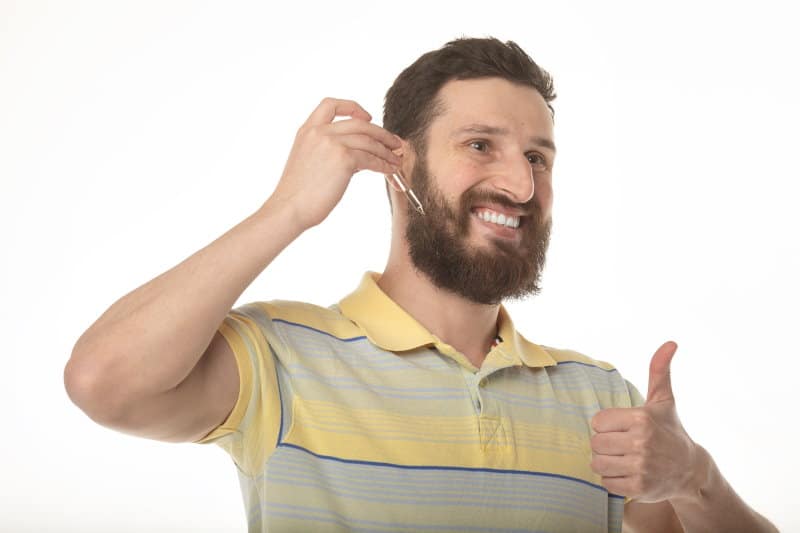Striving for improved beard growth, many guys will pay any price and try any product. Although there are options that have shown success in growing facial hair, there is also a lot of snake oil pitched to naïve beardsmen. You might have heard of Hyaluronic Acid, which is often marketed as a youth-enhancing, cell-fortifying cure-all. What is its effect on beard growth?
Hyaluronic Acid is an excellent hydrating ingredient found in scrubs and conditioning products. It has demonstrated success in reducing the signs of aging and improving hair health. Hyaluronic Acid will impart many benefits to your face and beard, but it won’t improve hair growth on its own.
In general, Hyaluronic Acid is a fascinating component in health and beauty products. We think that it is worth digging into what it is and how it affects skin and hair.
What is Hyaluronic Acid?
Before discussing what benefits, if any, Hyaluronic Acid might impart to your facial hair, we need to understand what it is.
To begin, Hyaluronic Acid is not the kind of acid that melted the Joker’s face. It isn’t caustic in any way.
On the contrary, your body produces its own Hyaluronic Acid from the moment you are born. It is particularly prevalent in your eyes and joints. Its function is to lubricate and soften various points of friction in your body. Most of us have a significant amount of the stuff inside us already.
People that do not produce sufficient Hyaluronic Acid might have joint pain, cataracts, mouth sores, and even arthritis. As such, medical providers often inject people with Hyaluronic Acid to treat these conditions. There is also some evidence that it can help with various skin conditions.
Before you start having paranoid Soylent Green style fears that beauty retailers are harvesting Hyaluronic Acid from human bodies, don’t worry. The ingredient in health and wellness products is synthetic. Labs create Hyaluronic Acid for sale using, among other things, rooster combs and lab-bred bacteria.
From a cosmetic perspective, Hyaluronic Acid is appealing because it is an effective humectant.
What is a Humectant?
Humectants are agents that draw in water—lots of it. A good humectant can pull in 1,000 times its weight in water and still retain its essential form. Some humectants, including Hyaluronic Acid, occur naturally in the body. Others are manufactured.
Humectants are prevalent in food and toiletries because they keep items moist even after long periods in storage. For example, think about American cheese slices, chocolate bars, and toothpaste. How do you think those all maintain a lush, even gelatinous, consistency in transit and on store shelves?
Cosmetics and skincare slaves love humectants. As we have stated time and again on this site, moisture is the key to healthy skin and facial hair. Many lotions, makeup, and anti-aging cures lean hard into humectants to draw hydration from the environment onto the skin.
What Products is Hyaluronic Acid Used In?
Hyaluronic Acid is almost unparalleled in its ability to seize hydration and draw it deep into your skin. In fact, it is even more effective than the emollient carrier oils used in beard oils and conditioners. Those oils moisturize your face and hair, but they only absorb just below your skin surface. Hyaluronic Acid goes deeper.
For that reason, Hyaluronic Acid is ubiquitous in many anti-aging products. These include:
- Rejuvenating shampoos and conditioners
- Anti-wrinkle face scrubs and ointments
- Body lotions and salves
- Face masks
- Scalp treatments
- Longevity serums
Those last two products typically involve a mixture of Hyaluronic Acid, water, and thinner humectants. They introduce as much hydration into your skin as possible. Many beauty experts recommend combining youth serums with lotions that contain emollient oils. The idea is to shore up the hydration in your skin, revivifying it to the max.
At least, that is the idea. But we must ask: how do you separate the claims made about Hyaluronic Acid from its reality?
Are There Any Proven Benefits for Hyaluronic Acid?

As we have stated already, Hyaluronic Acid finds its way into lots of anti-aging products. In many ways, it is a catch-all rejuvenation ingredient. It is known to impart lots of moisture to the skin. Does that mean it can actually reverse aging and spur better skin and hair?
Let’s be as analytical as possible here. Medically, we know that Hyaluronic Acid is effective in treating joint swelling and cataracts. For these conditions, doctors usually inject it. Droplets can reduce mouth sores. Additionally:
- Hyaluronic Acid drops have proven somewhat successful with treating persistent eye dryness.
- Injections of Hyaluronic Acid have provided some relief for osteoarthritis.
- Injected Hyaluronic Acid has shown some efficacy in reducing facial wrinkles.
This agent has played a part in trials to treat many other disorders, from diabetes sores to ear infections to heartburn. The results of these trials are mixed and largely inconclusive.
Please note that all testing for skin rejuvenation with Hyaluronic Acid involves injections, not topical application. There is essentially no evidence that Hyaluronic Acid will roll back the tide of time when rubbed onto your face.
Is there a Connection between Hyaluronic Acid and Hair Growth?
For beardsmen’s purposes, the question is not whether Hyaluronic Acid will cure wrinkles or help eyesight. Those are both worthwhile pursuits, but we want to know about hair. How did Hyaluronic Acid become a go-to product for hair growth?
You can find Hyaluronic Acid in countless hair products: shampoos, conditioners, scalp salves, de-frizzing sprays, stylers, etc. Basically, anything promising to “rejuvenate” your hair has it. And let’s be clear: this ingredient does some nice stuff. For example:
- It hydrated your scalp, follicle roots, and hair strands.
- It protects the follicle from outside moisture, reducing frizziness.
- It strengthens your hair by making it fuller, less dry, and less brittle.
In total, Hyaluronic Acid offers some tremendous benefits. You will notice, though, that we didn’t say that it outright grew more hair. That’s because there is little evidence that it does. Essentially, Hyaluronic Acid enriches everything around your hair.
That puts you in an excellent position to grow more hair, but it doesn’t do the growing for you. Think of it like adding premium-grade oil to your car engine. If the car has no gas, all the oil in the world won’t make it run.
What Beard Products Use Hyaluronic Acid?
We mentioned earlier that Hyaluronic Acid is in conditioners, moisturizers, and styling products intended for your scalp. It can also be found in similar products for your beard. You can find it in beard shampoos, conditioners, oil, butters, balms, stylers, and serums.
Hyaluronic Acid is a headline ingredient of sorts. Men’s grooming companies like to emblazon their products with its presence. That is all well and good, especially since it has such practical hydrating qualities. It’s also an excellent way to justify charging a premium for the item. Beard oils and balms that contain Hyaluronic Acid exist on the higher end of the price spectrum.
Even pricier are the so-called activators and growth serums. These super-hyped miracle tonics mix Hyaluronic Acid with ionized water, vitamins, and all sorts of special additions.
We have written about other prominent beard growth solutions in the past. We have also touched on men’s grooming products with gimmicky growth additives. More often than not, our position is to take a skeptical view of any product that claims to improve facial hair growth.
Even so, there is scientific backing for some of Hyaluronic Acid’s claims. It’s not just fish oil and a fancy label. Is it possible that it really does help grow your beard?
Does Hyaluronic Acid Work?

We think it would be unfair to just Hyaluronic Acid’s usefulness exclusively based on its beard-growing properties. So, we want to explore four metrics that people associate with it. We will tell you how effective it is on each front.
Hydration
Firstly, let’s look at Hyaluronic Acid’s most essential property: its ability to impart moisture. It is unassailable on this point. If you intend to spend extra on a beard product with Hyaluronic Acid, this should be the primary reason. Your face and beard will see improved fullness, lushness, and vitality.
That’s awesome in and of itself, but it also has positive follow-on effects. For example, a well-hydrated face and beard are less itchy and less prone to acne. Hydrated facial hair is less likely to break or become ingrown over time. These beards are also softer to the touch, which your significant other will definitely appreciate.
Hyaluronic Acid’s moisturizing capabilities are enough for us to recommend products containing it!
Appearance
We have already written at length about how conditioning and oiling your facial hair make it look great—applying well-mane beard products to your face results in a darker, fuller, more textured appearance. Hyaluronic Acid effectively supercharges this effect.
The extra boost of durable moisture in your facial hair will make it look positively lavish. Hyaluronic Acid also reduces dandruff, a definite bonus for a great-looking beard.
Frequently, guys believe they are looking for extra beard growth when really more fullness in their existing facial hair will do the trick. So, don’t discount this part of Hyaluronic Acid’s appeal.
Youthfulness
One theme that returns again and again in the discussion of Hyaluronic Acid is rejuvenation. Makeup, lotions, cleansers, and conditioners containing this ingredient all claim to be able to slow or reverse aging. As we’ve stated, Hyaluronic Acid injections can reduce wrinkles. But what about youthfulness in facial hair?
To the extent that Hyaluronic Acid hydrates and intensifies your beard, it might make your facial hair look more youthful. However, it does nothing to reverse or slow with physical changes that hair undergoes. Most importantly, it won’t slow the depletion of melanin cells that leads to white hairs.
Growth
Here, we come to the thorniest of all beard product questions. Simply put, nothing on the market can guarantee you better beard growth. The extent to which your facial hair grows depends on your individual physiology and genetics. So, any improvement in your beard growth through supplements, salve, or medications will be marginal.
Even so, Hyaluronic Acid’s hydrating and revivifying qualities might set you up for fuller hair growth. Is that sufficient to say that it helps beards grow? Not really.
We recommend you think of Hyaluronic Acid as an enhancement for more direct beard growth regimens. We will get into alternative growth spurring options later in this article.
Are There Side Effects to Taking Hyaluronic Acid?

Pretty much anything you put in your body, even something as innocuous as vitamin supplements, can have adverse side effects. As a general rule, you should be aware of these possible issues before introducing something new to your body.
Hyaluronic Acid’s list of side effects is relatively small. You may have an allergic reaction to it, whether you take it orally or topically. However, these reactions are exceedingly rare. The most significant side effects occur with Hyaluronic Acid injections. Those don’t come into play when discussing beard growth techniques.
However, if you have the skin condition scleroderma, applying Hyaluronic Acid to your skin might exacerbate ulcers.
What Alternatives to Hyaluronic Acid Are Out There?
Hyaluronic Acid can provide an excellent foundation for a more comprehensive beard-growing treatment. Providing skin and hair follicles with better hydration is a significant first step in this process. Here are some ideas for other measures you can take.
Minoxidil
Of all the beard enhancement options out there, minoxidil has the most documented success. You probably know this medication by its retail names: Rogaine and Hims.
Minoxidil improves hair growth by dilating the small blood vessels that provide nutrients to follicle roots. Most users of the drug want to improve the coverage on their scalp. Yet, nothing is stopping you from applying this topical medicine to your face for beard growth. Indeed, quite a few industrious beardsmen have done just that with some success.
A word of warning: this option is an off-label usage of minoxidil. While minoxidil is an over-the-counter medication, it nonetheless has some side effects. We encourage you to investigate the literature on this drug before trying it yourself
Biotin
Let’s start by acknowledging that there are countless vitamins and minerals that can improve your hair quality. Yet Vitamin B7, or Biotin, is a particular favorite with the bearded masses.
Biotin’s main selling point is that it improves cell metabolism. This means that it encourages cell enzymes to break down proteins and carbohydrates into the nutrients needed to feed hair follicles. People with Biotin deficiencies often see premature balding and weak fingernails.
Biotin supplements undoubtedly encourage faster, more vigorous growth in existing hair and nails. There’s less conclusive evidence that it improves new hair growth. Bear that in mind before you go all-in on this vitamin.
We also should note that Biotin is much more effective when taken orally instead of topically.
Lifestyle Changes
We know this is a broad topic. We will attempt to synthesize it into a few tried and true beard-growing tips. Here are some lifestyle choices you can make that will help improve your beard fullness and coverage:
- Get a full night’s sleep. This will help your body process nutrients, and it prevents growth-inhibiting stress.
- Exercise regularly. This will boost the testosterone that helps spur facial hair growth.
- Eat lots of fish, egg, kale, nuts, and seeds. These foods contain oodles of fats and acids that hairs crave. A well-calibrated diet will prevent the need for vitamin supplements.
- Bathe. You hopefully do this anyway, but it’s vital that you pay particular attention to facial cleansing. A clean face will be less obstructive to hair growth. Also, avoid caustic scrubs and scalding hot water. They will rob your face of critical natural oils.
These aren’t the only lifestyle changes that can improve your beard health. Yet, they are the easiest to implement and make a significant impact. Also, they’re just plain good for you.
Time
We bring this up specifically for younger readers out there. Guys going through puberty can be impatient to become full-fledged men. Whether that means frantically looking for a partner or agonizing over your pimples, it can be stressful.
Try not to get too impatient about your facial hair. For many people, the ability to grow a beard improves slowly. You might be well into your twenties before you get anything like full coverage. We understand the urge to force the process, but in the end, time might be the best remedy.
The Bottom Line
In the end, there is no debate that Hyaluronic Acid is excellent for your skin and hair. It hydrates both extraordinarily. While beard care products containing it tend to be pricy, you get many benefits for that extra cash.
However, it wouldn’t be accurate to say that Hyaluronic Acid actually grows hair. If you want to improve your facial hair coverage, Hyaluronic Acid can help, but it won’t do the trick alone.
Incidentally, if you have ever wondered why your facial hair grows unevenly, take a look at our comprehensive explainer on that topic.

